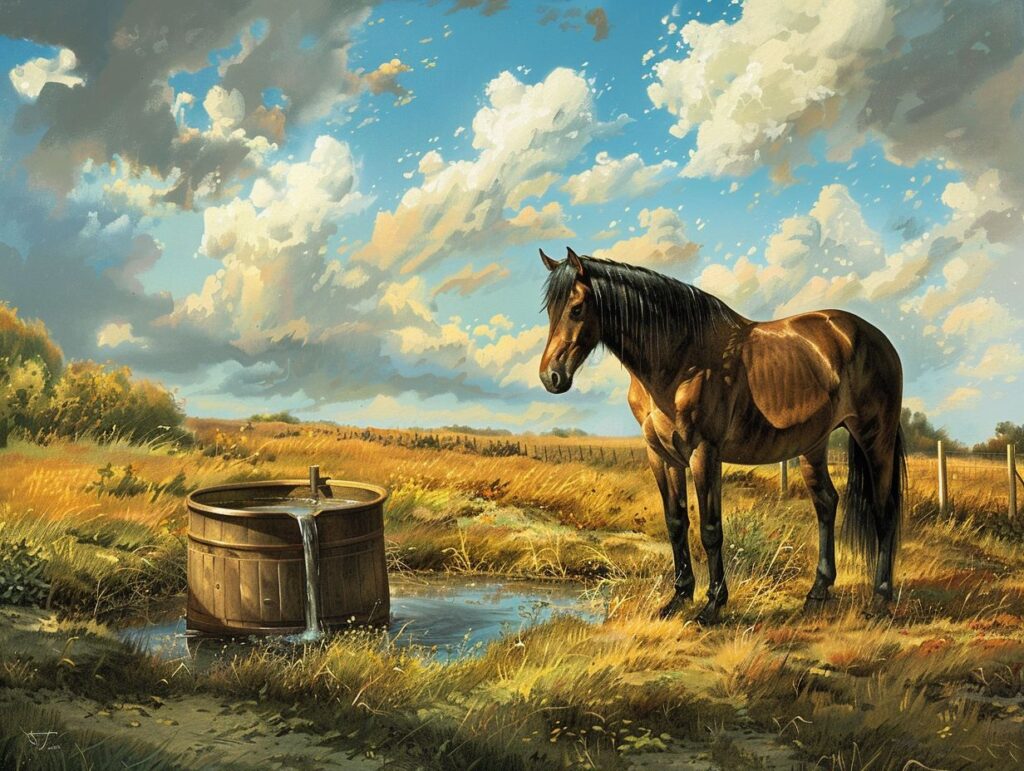- Horses, like all animals, rely on proper hydration to stay healthy and thrive.
- Exploring the causes of dehydration in horses and the signs and symptoms to watch out for is crucial.
- Understanding how to prevent dehydration through proper hydration practices and identifying risk factors is essential for any horse owner.
- Discussing effective rehydration techniques and recognizing when it is vital to seek veterinary care for severe dehydration emergencies.
- Learners will discover how to keep their horses happy and hydrated.
Understanding Horse Dehydration
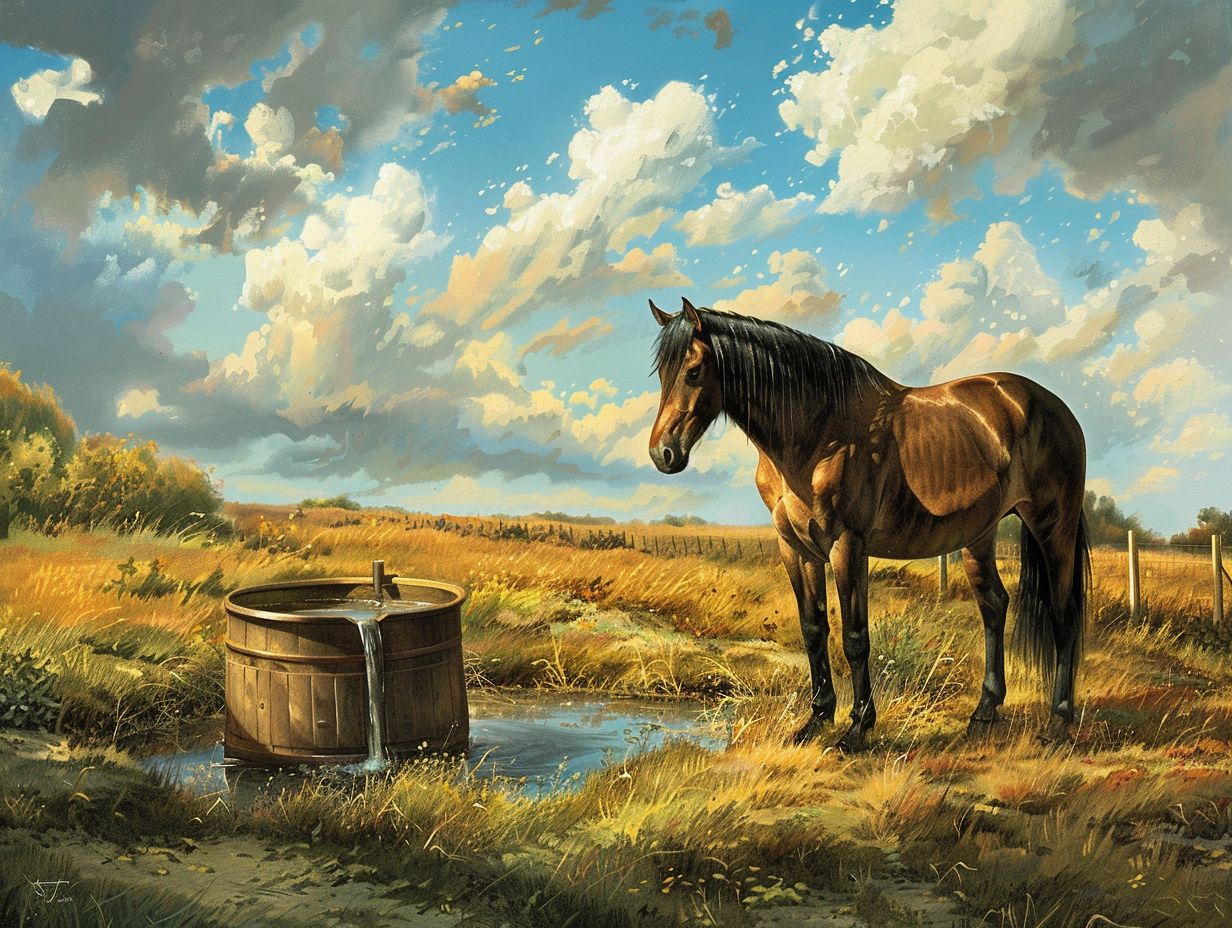
Understanding horse dehydration is essential for equine health and welfare. Proper hydration is crucial for horses, as they are susceptible to dehydration, particularly in hot weather or during strenuous exercise.
What Causes Dehydration in Horses?
Dehydration in horses can arise from various factors, including inadequate water intake, excessive salt consumption, prolonged exercise, and environmental conditions, such as heat stress.
One common issue seen in horses is insufficient water intake, as they may not consume enough water to offset the fluid lost through sweating and urination.
While salt intake is essential for maintaining electrolyte balance, excessive salt consumption without sufficient water intake can contribute to dehydration.
Horses engaged in prolonged or intense exercise face a higher risk of dehydration due to increased fluid loss.
Additionally, environmental factors like hot and humid weather can worsen dehydration, as horses struggle to regulate their body temperature and fluid balance in such conditions.
Signs and Symptoms of Dehydration in Horses
Recognizing the signs and symptoms of dehydration in horses is essential for early intervention and treatment. These signs may present as dry skin, sunken eyes, lethargy, abnormal capillary refill time, and alterations in gum color.
Physical Indicators
Physical indicators of dehydration in horses include dry or tacky skin, sunken eyes, abnormal capillary refill time, pale gums, and electrolyte imbalances.
Dry or tacky skin is often one of the first visible signs of dehydration in horses. When observing the skin, look for elasticity and moisture levels. Sunken eyes can also be a key indicator, as well as abnormal capillary refill time when pressing on the gums. A pale gum color may suggest dehydration and electrolyte imbalances. Monitoring electrolyte levels is crucial in assessing hydration status and ensuring proper balance within the horse’s body.
Behavioral Changes
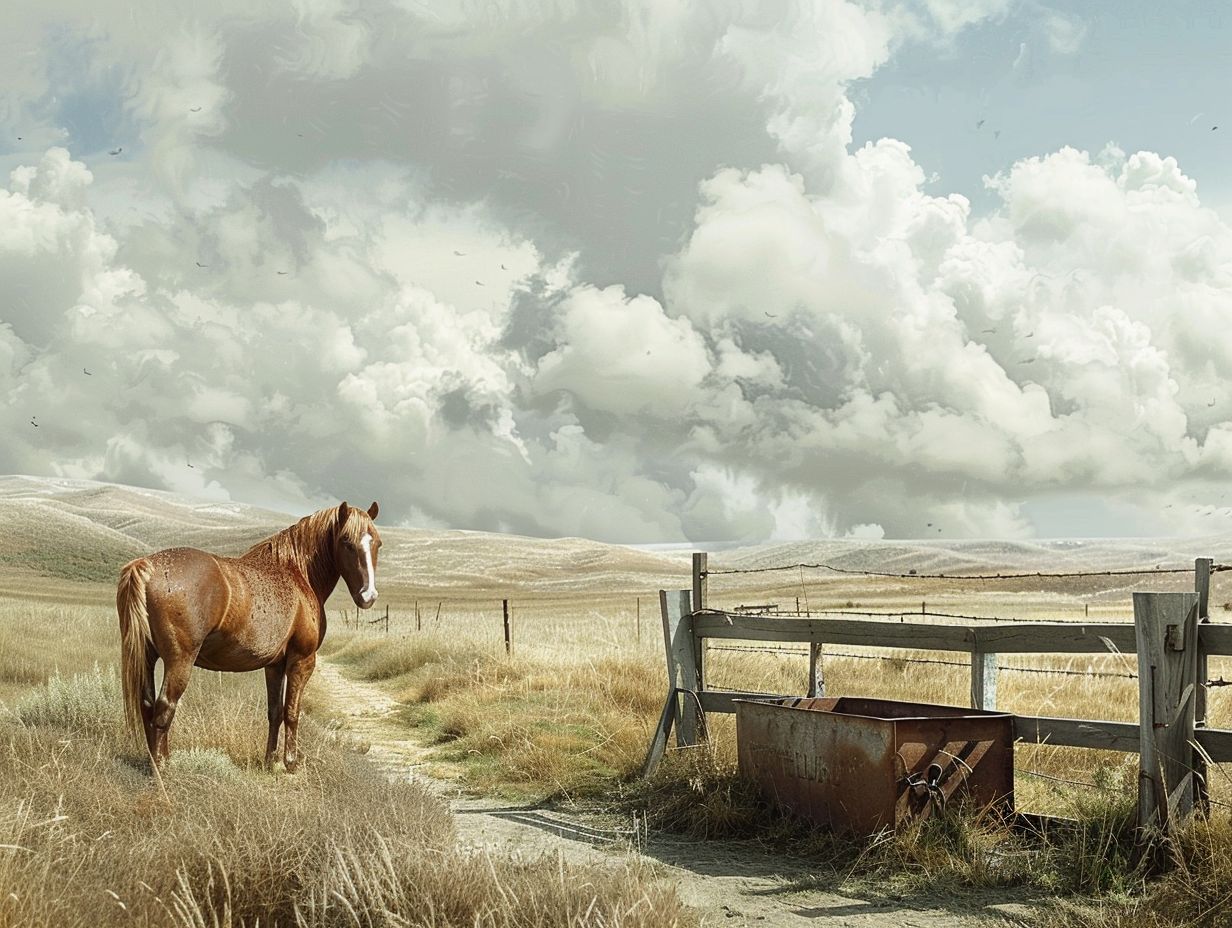
Behavioral changes in dehydrated horses may include increased lethargy, reduced water consumption, altered eating habits, and unusual equine behaviors.
Dehydration can cause a noticeable decrease in a horse’s usual activity levels, with affected horses appearing less energetic and engaged in their surroundings. They may show reluctance to drink water or have a reduced interest in feed, leading to changes in their eating patterns. Owners should be vigilant for signs such as sunken eyes, dry mucous membranes, and prolonged skin tenting, as these can indicate dehydration in horses. Observing and understanding these behavioral shifts is crucial for timely intervention and proper hydration management in equines.
Preventing Dehydration in Horses
Preventing dehydration in horses necessitates implementing proactive hydration strategies, ensuring proper water management, and vigilantly monitoring equine health concerns to uphold optimal hydration levels.
Proper Hydration Practices
Implement proper hydration practices by ensuring access to clean water sources, monitoring water intake, and providing adequate pasture access for grazing.
Water quality is essential for maintaining the health and well-being of horses. Contaminated water can result in severe health issues, underscoring the importance of routinely checking and cleaning water sources. Monitoring water intake is also critical; a horse typically needs to drink approximately 5-10 gallons of water daily. Along with water sources, pasture availability plays a crucial role in hydration. Grazing enables horses to ingest additional water through the plants they consume, thereby enhancing their overall hydration levels.
Identifying and Addressing Risk Factors
Identifying and addressing dehydration risk factors in horses involves managing heat stress, optimizing equine nutrition, and implementing effective hydration strategies.
In terms of horses, heat stress can be a significant factor affecting hydration levels, particularly in hot and humid environments. The increased temperatures can result in excessive sweating, leading to a rapid loss of essential electrolytes and fluids.
Proper nutrition is key in maintaining optimal hydration levels for horses, as they require adequate water intake and balanced electrolytes to support their physiological functions. Monitoring salt consumption and ensuring access to fresh, clean water are essential practices to prevent dehydration.
To combat dehydration risks in horses, it is important to implement hydration strategies such as providing electrolyte supplements, ensuring consistent access to water, and adjusting feeding schedules based on workload demands.
Treating Dehydration in Horses
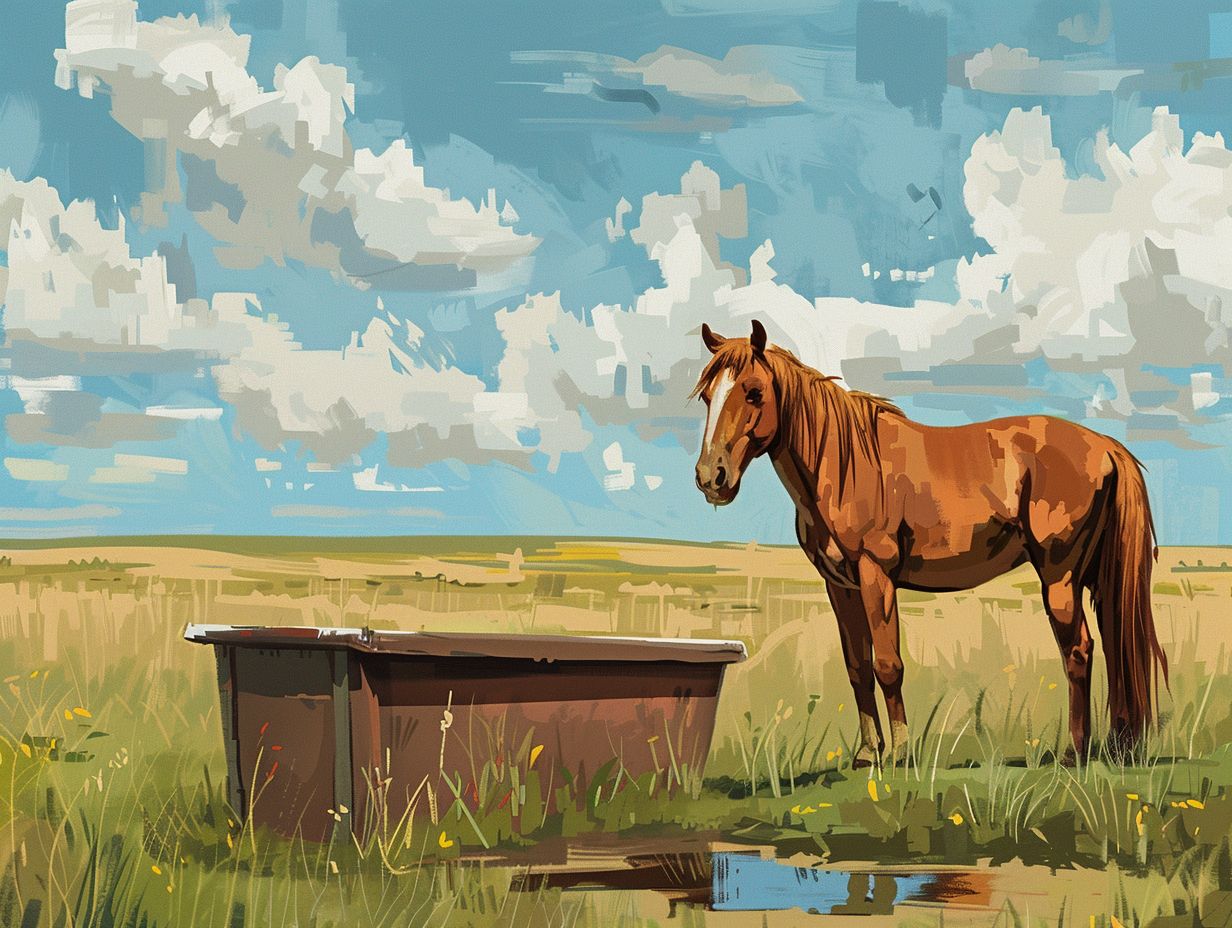
Treating dehydration in horses involves rehydration through fluid therapy, administering electrolyte supplements, and implementing tailored equine dehydration treatment strategies.
Effective Rehydration Techniques
Effective rehydration techniques in horses involve close monitoring by veterinary professionals, conducting hydration assessments, and implementing comprehensive dehydration management protocols.
Regular assessment of a horse’s hydration status is crucial, as dehydration can lead to serious health complications. Veterinary professionals often use methods such as skin tenting, capillary refill time, and mucous membrane moisture levels to evaluate hydration levels. It’s important to note that various factors like weather, exercise intensity, and overall health can impact a horse’s hydration needs.
Dehydration management practices may include oral electrolyte supplementation, intravenous fluid therapy, and adjusting the horse’s diet to ensure adequate water intake. By prioritizing proper hydration, horse owners can help maintain their equine companion’s overall health and performance.
When to Seek Veterinary Care
Understanding when to seek veterinary care for dehydrated horses is crucial in preventing complications related to dehydration and promptly addressing any emergencies.
Signs of Severe Dehydration and Emergencies
Signs of severe dehydration in horses may manifest as extreme lethargy, sunken eyes, and prolonged capillary refill time, highlighting the necessity for urgent treatment and thorough investigation of dehydration causes.
Other crucial indicators of severe dehydration in horses that you should be mindful of include dry, sticky gums, reduced skin elasticity, and an elevated heart rate. In situations of severe dehydration, horses may also demonstrate weakness or collapse, dark-colored urine, and a diminished appetite.
It is imperative to promptly address dehydration to avert further complications like organ failure or shock. Immediate treatment typically involves the administration of fluids, either orally or intravenously, in conjunction with identifying and resolving the root causes such as insufficient water intake, excessive sweating, or illnesses leading to fluid loss.
Frequently Asked Questions
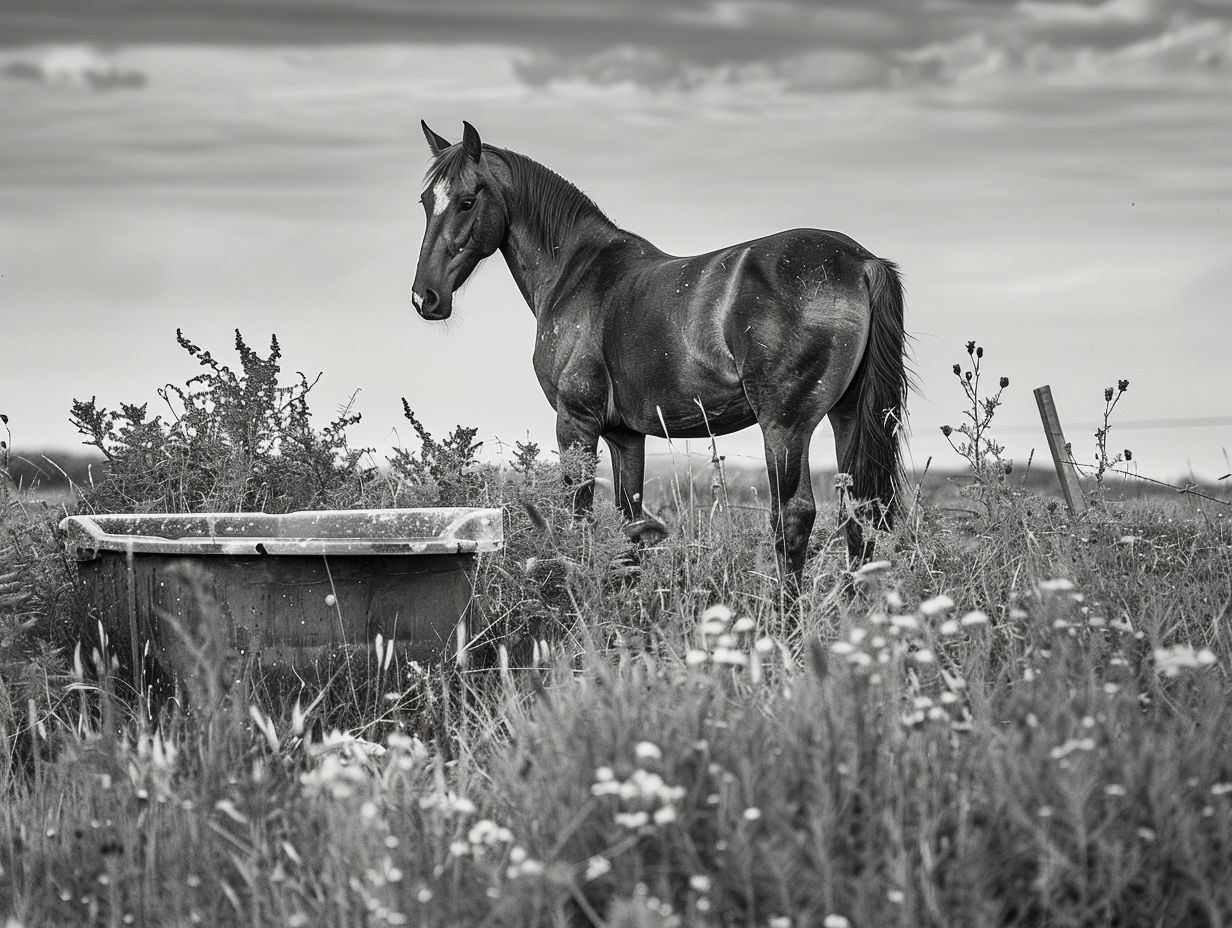
How to Tell if Your Horse is Dehydrated?
There are a few ways to tell if your horse is dehydrated. You can check for dry gums, sunken eyes, decreased skin elasticity, and a decrease in urination frequency.
Why is it Important to Monitor Your Horse’s Hydration?
Dehydration can lead to serious health issues for horses, including colic and kidney damage. Monitoring your horse’s hydration is crucial for their overall well-being.
What are Some Signs of Mild Dehydration in Horses?
If your horse is mildly dehydrated, you may notice a decrease in appetite and energy levels, as well as a slightly sunken appearance in their eyes.
How Can I Encourage My Horse to Drink More Water?
Adding electrolytes to your horse’s water can help encourage them to drink more. You can also offer wet feed or soaked hay to increase their water intake.
What are Some Potential Causes of Dehydration in Horses?
Dehydration in horses can be caused by a variety of factors, including excessive sweating, insufficient water intake, and illnesses such as diarrhea or fever.
When is it Necessary to Seek Veterinary Care for Dehydration?
If your horse is severely dehydrated, it is important to seek veterinary care immediately. Signs of severe dehydration include lethargy, rapid breathing, and a weak pulse.
